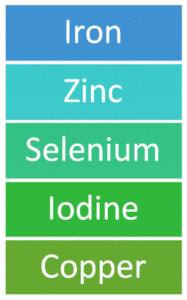Last week’s post provided an introduction to the body’s mineral requirements and offered a few details about the 7 essential macrominerals. While I do not plan to present information on all other essential minerals, a few of the trace minerals capture my attention.
 Iron tops the list in public awareness given the prevalence of products (and associated advertising) targeting folks with “iron-poor blood.” Seventy percent of the body’s iron finds its way into red blood cells (hemoglobin) and muscle cells (myoglobin). Both are responsible for accepting, storing, transporting, and releasing oxygen from the lungs into tissues. Another twenty-five percent of the body’s iron takes the form of ferritin which regulates iron utilization in the cells and bloodstream. The remainder are constituent elements in certain proteins and enzymes that support vital metabolic functions.
Iron tops the list in public awareness given the prevalence of products (and associated advertising) targeting folks with “iron-poor blood.” Seventy percent of the body’s iron finds its way into red blood cells (hemoglobin) and muscle cells (myoglobin). Both are responsible for accepting, storing, transporting, and releasing oxygen from the lungs into tissues. Another twenty-five percent of the body’s iron takes the form of ferritin which regulates iron utilization in the cells and bloodstream. The remainder are constituent elements in certain proteins and enzymes that support vital metabolic functions.
Nutritionist Roberta Anding tells us that roughly 10% of dietary iron gets absorbed by the body. Heme iron in animal products proves more bioavailable than plant-based sources. It matters when you ingest iron. Calcium, zinc, magnesium, phosphorous, phytates, and soy inhibit iron absorption.
Iron deficiency manifests as fatigue, lightheadedness, leg cramps, cold intolerance, infections, shortness of breath, and difficulty swallowing. Iron deficiency anemia typically results from blood loss due to menstrual bleeding, gastrointestinal disorders, peptic ulcers, and certain cancers. It may also result from poor iron absorption as can occur with celiac disease, gastric bypass, Crohn’s disease, and excessive use of antacids. Vegetarians, vegans, and older adults may be prone to iron deficiency.
Zinc has grown in the public consciousness due to published claims of its ability to reduce the severity and duration of common colds. (Anding says the jury may still be out!) We do know that zinc plays a role in wound healing, tissue growth/repair, blood clotting, DNA synthesis, taste perception, bone mineralization, and healthy thyroid function. It’s also involved in blood sugar control and is required for maintenance of Vitamin E in the blood. Anding tells us that the body leverages 15-40% of dietary zinc, with meat sources being four to five times more bioavailable than plant sources. Zinc competes with iron, calcium, and copper for absorption. Deficiencies are most prevalent in older populations and typically manifest as a loss of taste, smell, and/or appetite.
Selenium works with Vitamin E as an antioxidant and plays a valuable role in thyroid function. It is also required for pancreatic function and tissue elasticity; it has shown to be protective against radiation and toxic minerals. Meat and poultry tend to be reliable sources of selenium as this mineral as regularly added to animal feed. Plant-based foods (notably grains) also provide selenium if grown in selenium-rich soil. Deficiencies can occur among folks with gastrointestinal disorders and those who’ve had gastric bypass surgery.
Like selenium, iodine plays an important role in producing thyroid hormones. These hormones affect our basal metabolic rate, heartbeats, rate of breathing, and mitochondrial activity. They’re also crucial for normal human development, sexual function, sleep, and cognition. Proper iodine utilization requires sufficient access to Vitamin A. Iodine deficiencies may cause muscle cramps, cold hands and feet, weight gain, poor memory, constipation, depression, and headaches. Excess iodine can be toxic. Unrefined sea salt, kelp, fish, broth, butter, pineapple, artichokes, asparagus, and dark leafy greens are good sources of iodine.
Copper helps the body form bone and hemoglobin and promotes healthy nerves, immune function, and collagen formation. It also plays an important role in memory and brain function. Copper does its work in conjunction with zinc and Vitamin C. High doses of zinc can precipitate a copper deficiency. While a variety of foods provide copper, beef liver is the best resource.
As noted in prior posts, make sure your physician is aware of any mineral supplements that you take regularly. The body needs a balanced intake of vitamins and minerals. Imbalances may introduce unwanted issues.